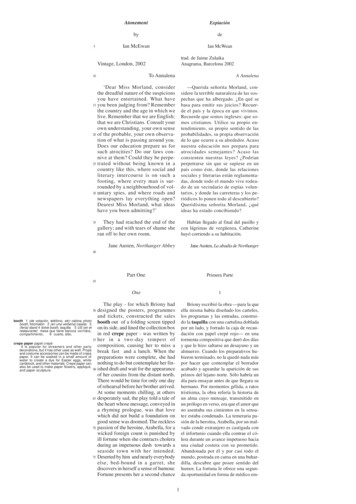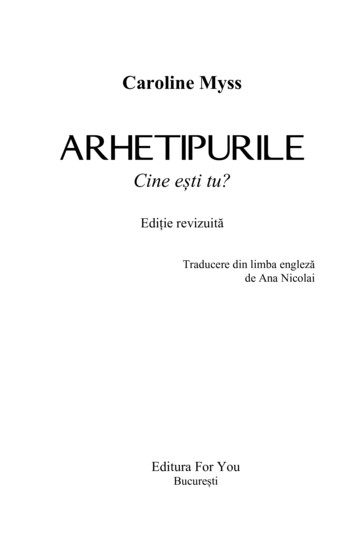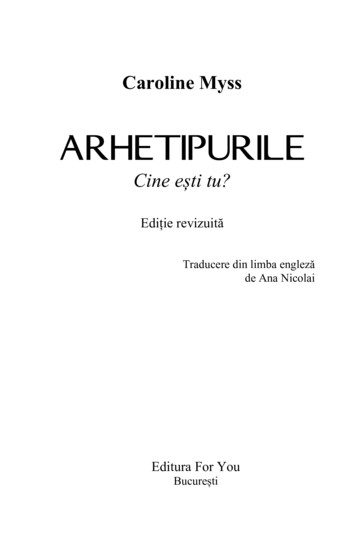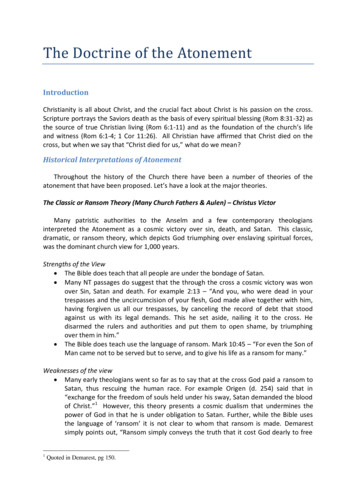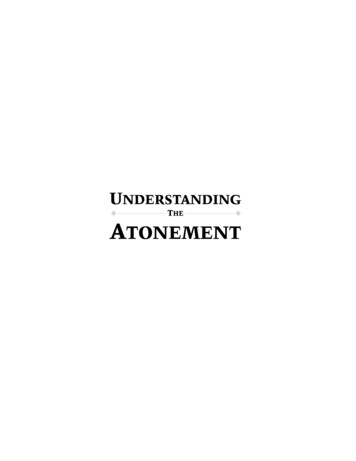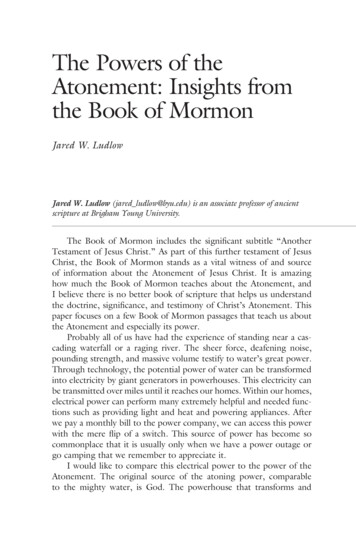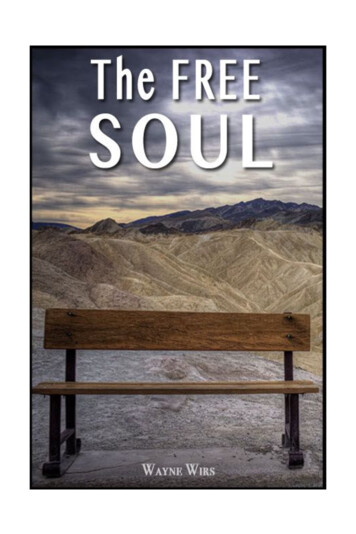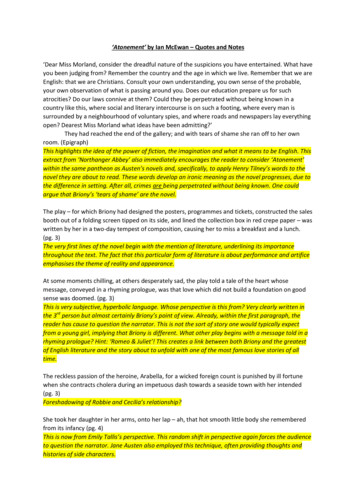
Transcription
‘Atonement’ by Ian McEwan – Quotes and Notes‘Dear Miss Morland, consider the dreadful nature of the suspicions you have entertained. What haveyou been judging from? Remember the country and the age in which we live. Remember that we areEnglish: that we are Christians. Consult your own understanding, you own sense of the probable,your own observation of what is passing around you. Does our education prepare us for suchatrocities? Do our laws connive at them? Could they be perpetrated without being known in acountry like this, where social and literary intercourse is on such a footing, where every man issurrounded by a neighbourhood of voluntary spies, and where roads and newspapers lay everythingopen? Dearest Miss Morland what ideas have been admitting?’They had reached the end of the gallery; and with tears of shame she ran off to her ownroom. (Epigraph)This highlights the idea of the power of fiction, the imagination and what it means to be English. Thisextract from ‘Northanger Abbey’ also immediately encourages the reader to consider ‘Atonement’within the same pantheon as Austen’s novels and, specifically, to apply Henry Tilney’s words to thenovel they are about to read. These words develop an ironic meaning as the novel progresses, due tothe difference in setting. After all, crimes are being perpetrated without being known. One couldargue that Briony’s ‘tears of shame’ are the novel.The play – for which Briony had designed the posters, programmes and tickets, constructed the salesbooth out of a folding screen tipped on its side, and lined the collection box in red crepe paper – waswritten by her in a two-day tempest of composition, causing her to miss a breakfast and a lunch.(pg. 3)The very first lines of the novel begin with the mention of literature, underlining its importancethroughout the text. The fact that this particular form of literature is about performance and artificeemphasises the theme of reality and appearance.At some moments chilling, at others desperately sad, the play told a tale of the heart whosemessage, conveyed in a rhyming prologue, was that love which did not build a foundation on goodsense was doomed. (pg. 3)This is very subjective, hyperbolic language. Whose perspective is this from? Very clearly written inthe 3rd person but almost certainly Briony’s point of view. Already, within the first paragraph, thereader has cause to question the narrator. This is not the sort of story one would typically expectfrom a young girl, implying that Briony is different. What other play begins with a message told in arhyming prologue? Hint: ‘Romeo & Juliet’! This creates a link between both Briony and the greatestof English literature and the story about to unfold with one of the most famous love stories of alltime.The reckless passion of the heroine, Arabella, for a wicked foreign count is punished by ill fortunewhen she contracts cholera during an impetuous dash towards a seaside town with her intended(pg. 3)Foreshadowing of Robbie and Cecilia’s relationship?She took her daughter in her arms, onto her lap – ah, that hot smooth little body she rememberedfrom its infancy (pg. 4)This is now from Emily Tallis’s perspective. This random shift in perspective again forces the audienceto question the narrator. Jane Austen also employed this technique, often providing thoughts andhistories of side characters.
Whereas her big sister’s room was a stew of unclosed books, unfolded clothes, unmade bed,unemptied ashtrays, Briony’s was a shrine to her controlling demon: the model farm spread across adeep window ledge consisted of the usual animals, but all facing one way – towards their owner – asif about to break into song, and even the farmyard hens were neatly corralled. (pg. 4-5)Repetition of ‘un’ suggests that her sister doesn’t finish things. This is a contrast to Briony whom theaudience first meets finishing something, and whose finished product they are themselves reading.This is foreshadowing for Cecilia whose life is unfinished (in that she dies at a young age) and who iseven unable to finish sexual intercourse, due to Briony’s interruption. The model farm highlightsBriony’s need for control and is a demonstration of her authorial desire to play God.A mutant double acorn, fool’s gold, a rain-making spell bought at a funfair, a squirrel’s skull as lightas a leaf. (pg. 5)Briony’s secrets are interesting. The double acorn is a seed which has lost the ability to germinate,the fool’s gold promises fortune but doesn’t follow through, the spell is worthless, and the skullliterally symbolises death. The only thing secret about these treasures is their location and, like thecontents, promise greater things but can’t deliver.Only when a story was finished, all fates resolved and the whole matter sealed off at both ends so itresembled, at least in one respect, every other finished story in the world, could she feel immune,and ready to punch holes in the margins, bind the chapters with pieces of string, paint or draw thecover, and take the finished work to show to her mother, or her father, when he was home. (pg. 6)Highlights the superficial. Appearance/reality.A world could be made in five pages, and one that was more pleasing than a model farm. Thechildhood of a spoiled prince could be framed within half a page, a moonlit dash through sleepyvillages was one rhythmically emphatic sentence, falling in love could be achieved in a single word –a glance. The pages of a recently finished story seemed to vibrate in her hand with all the life theycontained. Her passion for tidiness was also satisfied, for an unruly world could be made just so. Acrisis in a heroine’s life could be made to coincide with hailstones, gales and thunder, whereasnuptials were generally blessed with good light and soft breezes. A love of order also shapes theprinciples of justice, with death and marriage the main engines of housekeeping, the former beingset aside exclusively for the morally dubious, the latter a reward withheld until the final page. (pg. 7)The power of literature. This is the author/Briony reflecting on their own art and is akin to Austen’sdefence of the novel in ‘Northanger Abbey’. Despite what Briony thinks here about the advantages ofthe novel, ‘Atonement’ does not conform to these expectations. There is pathetic fallacy used (theheat) but that differs greatly from the dramatic storms Briony images. Also consider that death is notset aside for the morally dubious as we see numerous victims of war die (a message on war itself) aswell as being told of Robbie and Cecilia’s deaths. The only marriage we see does not come on thefinal page and is certainly no reward.That Lola, who was fifteen, and the nine-year-old twins, Jackson and Pierrot, were refugees from abitter domestic civil war should have mattered more to Briony. (pg. 8)This is almost certainly the older Briony’s perspective, speaking in hindsight, saying what she shouldhave been concerned with.She vaguely knew that divorce was an affliction, but she did not regard it as a proper subject. (pg. 8)Divorce does not fit with Briony’s ideas of romance and ‘stories’. It is not a happy ending and cannotbe undone.
Marriage was the thing, or rather, a wedding was, with its formal neatness of virtue rewarded, thethrill of its pageantry and banqueting, and dizzy promise of a lifelong union. A good wedding was anunacknowledged representation of the as yet unthinkable – sexual bliss. In the aisles of countrychurches and grand city cathedrals, witnessed by a whole society of approving family and friends,her heroines and heroes reached their innocent climaxed and needed to go no further. (pg. 9)This perspective highlights Briony’s naïveté. Her insistence that the wedding is ‘the thing’ placesemphasis on superficial artifice. This also displays her sexual innocence, possibly explaining hermisinterpretation of later events.Like re-armament and the Abyssinia Question (pg. 9)This foreshadows the war.This trio clearly had the knack of being what they were not. (pg. 10)Reality/illusion. Encourages the audience to question anything they hear about/from these threecharacters.The best that could be said was that Arabella’s lack of freckles was the sign – the hieroglyph, Brionymight have written – of her distinction. Her purity of spirit would never be in doubt, though shemoved through a blemished world. (pg. 10)Ironic as Lola (who plays Arabella) is about to lose her purity. Her purity (innocence) is neverquestioned throughout the novel, in regards the rape and her knowledge of her attacker.Briony knew he had a point. This was precisely why she loved plays, or hers at least; everyone wouldadore her. (pg. 11)Beautiful and dead, and barefoot, or perhaps wearing the ballet pumps with the pink ribbon straps (pg. 14-15)Even when supposedly distraught and dramatic, Briony is concerned with the superficial andappearance.Bernini’s Triton. (pg. 18)Appearance/reality. The fountain is a reproduction and not the real thing. Triton was a Greek Godand messenger of the sea. He was usually represented as a merman. This ties into the theme ofappearance/reality as historically, sailors’ encounters with mermaids were often actuallydugongs/manatees. Mermaids were also often a symbol of disaster as they lured ships onto the rockswith their songs. Because Triton (a merman) stands over Robbie and Cecilia during the turning pointof their relationship, he can be seen to be foreshadowing the misery they will later face and theoncoming disaster. Triton had a conch shell which could raise or calm waves, however this issubverted somewhat when it is revealed that the fountain “could blow through his conch a jet onlytwo inches high”. This is underwhelming, much like Robbie and Cecilia’s thwarted relationship. Firstappearance of water as a motif.
Could not conceal the ugliness of the Tallis home – barely forty years old, bright orange brick, squat,lead-paned baronial Gothic, to be condemned one day in an article by Pevsner, or one of his team,as a tragedy of wasted chances. (pg. 19)Appearance/reality. The Tallis house is in the Gothic style, despite being barely forty years old and,thus, too young to be truly Gothic. Pevsner (and his team) wrote architectural guides to the UK. Thiscomment about their condemnation demonstrates perspective and hindsight. The description of a‘tragedy of wasted chances’ could also be used to describe the novel.Cecilia’s grandfather, who grew up over an ironmonger’s shop and made the family fortune with aseries of patents on padlocks, bolts, latches and hasps. (pg 19)These are all things used to keep secrets.The vase she was looking for was on an American cherry-wood table by the French windows whichwere slightly ajar. (pg. 20)The mention of ‘American’ and ‘French’ foreshadows the war.By the unplayed, untuned harpsichord and the unused rosewood music stands. (pg. 20)The focus here is on appearance, rather than use.Richardson’s Clarissa. (pg. 21)This is one of the longest novels in the English language. In it Clarissa is raped (like Lola) and betrayedby her family (like Cecilia). The title character’s name is not unlike Cecilia. Indeed, Austen makesreference to the novel ‘Cecilia’ by Frances Burney in ‘Northanger Abbey’. In this, an orphan heiressmust make her own way in London, much in the same way that Cecilia has to after she disowns herfamily after Robbie’s trial. The fact that she is constantly reading and not finishing, again underlinesthe unfinished nature of Cecilia’s story.The ancestors were irretrievably sunk in a bog of farm labouring, with suspicious and confusingchanges of surnames among the men, and common-law marriages unrecorded in the parishregisters. (pg. 21)The phrasing of ‘irretrievably sunk in a bog’ demonstrates Cecilia’s opinion of the lower workingclasses. This explains why she is so quick to assume that Danny Hardman is responsible for rapingLola. The fact that she made only a ‘half-hearted start’ on the family tree, again underlines theunfinished nature of Cecilia’s story.A hangover from his Communist Party time – another abandoned fad, along with his ambitions inanthropology, and the planned hike from Calais to Istanbul. (pg. 22)Communism doesn’t seem to fit Robbie. This is about the value of community and against thebourgeoisie. This is ironic given Mr Tallis is paying for his education. The idea of hobbies asabandoned fads creates a link with Cecilia who, it has already been identified, also does not finish orsee things through. The hike is foreshadowing Robbie’s later activities. Calais is in France, andIstanbul in Turkey. The coming war which Robbie will be involved with will stretch across Europe fromFrance to Turkey. He will later hike across France in Part 2, though not as he imagined.It had once belonged to her Uncle Clem, whose funeral, or re-burial at the end of the war sheremembered quite well: the gun carriage arriving at the country churchyard, the coffin draped in theregimental flag, the raised swords, the bugle at the graveside. (pg. 22)This foreshadows Robbie’s ultimate fate.
Meissen porcelain. (pg. 23)German company, but comes to represent the English.In order to achieve a natural chaotic look the flowers had simply been dropped in the vase in thesame carefree spirit with which they had been picked. (pg. 23)Contrast with Briony.His death just a week before the Armistice. (pg. 24)Foreshadows Robbie’s fate but also places emphasis on family. The fact that he died just a weekbefore the Armistice and that Robbie dies just before he can leave Dunkirk – so close to being saved,makes a statement about the waste of life during war.‘How’s Clarissa?’ ‘I’d rather read Fielding any day’ (pg. 25)The first time the reader sees Robbie and Cecilia communicate, they are talking about literature,creating a link between the couple and this in the reader’s mind. Fielding refers to Henry Fielding whois known for his satire.She saw his eyes again, green and orange flecks, l
the novel, ‘Atonement’ does not conform to these expectations. There is pathetic fallacy used (the heat) but that differs greatly from the dramatic storms Briony images. Also consider that death is not set aside for the morally dubious as we see numerous victims of war die (a message on war itself) as well as being told of Robbie and ecilia’s deaths. The only marriage we see does not .
